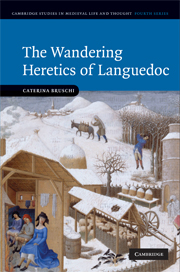2 - CATHARISM AND ITS MOBILITY
Published online by Cambridge University Press: 21 July 2009
Summary
A STARTING POINT
Most of the depositions of Doat 21–6 deal with actions, the majority of them – as one would expect – patently incriminating acts which bring individuals into contact with the ‘pollution’ of heresy. Being present at public or private preaching, helping well–known heretics or sympathisers, but especially sharing ritual celebrations or meals with them, all constituted possible grounds for suspicion, and led to further investigation. This is why answers dealing with such things pepper our texts, whether they are recorded together with the questions or not. At the same time, however, the interest of the inquisitor identified another very important area, which is frequently investigated in the records: the mobility of the heretics.
Nearly all the evidence deals with deponents talking about moving from one place to another. They themselves or their neighbours and relatives are depicted strolling down the roads of a village, but also planning long trips, moving simply from one village to the next, going with a companion on a pilgrimage that could be as far as Rome or the Holy Land, riding on an ass to visit some ill acquaintances, and so on. Distances vary, as do the destinations and purposes of their trips.
What is surprising is not the frequency of movements in the records – as we have said, this was a selection of each deponent's everyday activities for the purpose of the interrogation.
- Type
- Chapter
- Information
- The Wandering Heretics of Languedoc , pp. 50 - 99Publisher: Cambridge University PressPrint publication year: 2009

